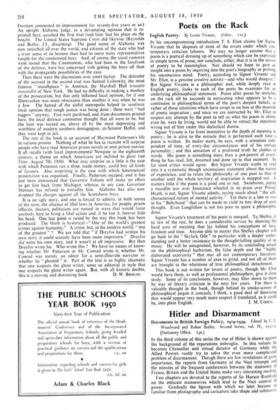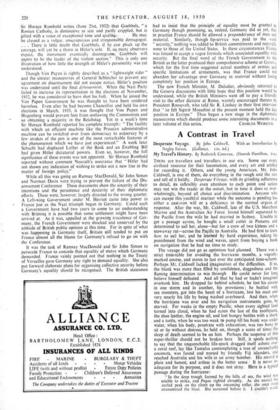Hitler and Disarmament
Documents in British Foreign Policy, 1919-1939. Edited by E. L. Woodward and Rohan Butler. Second Series, vol. IV, 1932-3. (Stationery Office. 253.) IN the third volume of this series the rise of Hitler is shown against the background of the reparations imbroglio. In this volume he becomes Chancellor and virtual dictator of Germany while the Allied Powers vainly try to solve the even more complicated problem of disarmament. Though there are few revelations of great importance, the reports from Germany of the Nazi triumph and the minutes of the frequent conferences between the statesmen of France, Britain and the United States make very interesting reading. Two chapters are devoted to the reports of Sir Horace Rumbold on the intricate manoeuvres which lead to the Nazi control of power. Gradually the figures with which we later. became so familiar from photography and caricature take shape and substance.
Sir Horace Rumbold writes (June 21st, 1932) that Goebbels, " a Roman Catholic, is diminutive in size and partly crippled, but is gifted with a voice of exceptional tone and quality.- . . He may be classed as a vulgar. unscrupulous and irresponsible demagogue. . . . There is little doubt that Goebbels, if he can pluck up the courage, will yet be a thorn in Hitler's side. lf,21many observers expect, the movement eventually disintegrates, Goebbels will aspire to be the leader of the violent section." This is only one illustration of how little the strength of Hitler's personality was yet understood.
Though Von Papen is rightly described as a " lightweight rider " and the sinister manoeuvres of General Schleicher to prevent any agreement on disarmament did not escape notice, Hitler's position was underrated until the final denouement. When the Nazi Party failed to increase its representation in the elections of November, 1932, he was considered to have shot his bolt. When he joined the Von Papen Government he was thought to have been rendered harmless. Even after he had become Chancellor and held his own elections in March, 1933, it was thought that Von Papen and Hugenberg would prevent him from outlawing the Communists and so obtaining a majority in the Reichstag. Yet in a week's time Sir Horace Rumbold reported his complete triumph: "The facility with which an efficient machine like the Prussian administrative machine can be switched over from democracy to autocracy by a few strokes of the pen is one of the most remarkable features of the phenomenon which we have just experienced." A week later Schacht had displaced Luther at the Bank and an Enabling Bill had given Hitler dictatorial powers. Even so, however, the full significance of these events was not apparent. Sir Horace Rumbold reported without comment Neurath's assurance that " Hitler had not shown any indication of wishing to strike out a new line in the matter of foreign policy."
While all this was going on Ramsay MacDonald, Sir John Simon and Norman Davis were trying to prevent the failure of the Dis- armament Conference These documents show the sincerity of their intentions and the persistence and dexterity of their diplomatic efforts. These were, however, largely directed to the wrong quarter. A Left-wing Government under M. Het riot came into power in • France just as the Nazi triumph began in Germany. Could such a Government have had two years to come to an understanding with Briining it is possible that some settlement might have been arrived at. As it was, appalled at the growing truculence of Ger- many, the French Government were shocked and unnerved by the attitude of British public opinion at this ,time. For in spite of what was happening in Germany itself, Britain still tended to put on France almost all the blame for Germany's refusal to go on with the Conference.
It was the task of Ramsay MacDonald and Sir John Simon to persuade France to concede that equality of status which Germany demanded. France vainly pointed out that nothing in the Treaty of Versailles gave Germany any right to demand equality. She also put forward elaborate plans for organising collective security before Germany's equality should be recognised. The British statesmen
had to insist that the principle of equality must be granted to Germany though promising, as, indeed, Germany did as yet, that in practice France should be allowed a preponderance of men and material. Similarly, though lip-service was paid to the word " security," nothing was added to British commitments and naturally none to those of the United States. In these circumstances France was forced to accept a vague formula which associated equality with security. But the final word of the French Government to the British as the latter produced their comprehensive scheme at Geneva, which for the first time suggested actual numbers of armies and specific limitations of armaments, was that France could not abandon her advantage over Germany in material without losing completely her position in Europe.
The new French Minister, M. Daladier, obviously returned to the Geneva discussions with little hope that this position would be understood, while the British Ministers went off to pay a friendly visit to the other dictator at Rome, warmly encouraged thereto by President Roosevelt, who told Sir R. Lindsay in their first interview that " he felt Signor Mussolini at the present moment held the key position in Europe." Thus began a new stage in the diplomatic manoeuvres which should produce some interesting documents in a



































 Previous page
Previous page